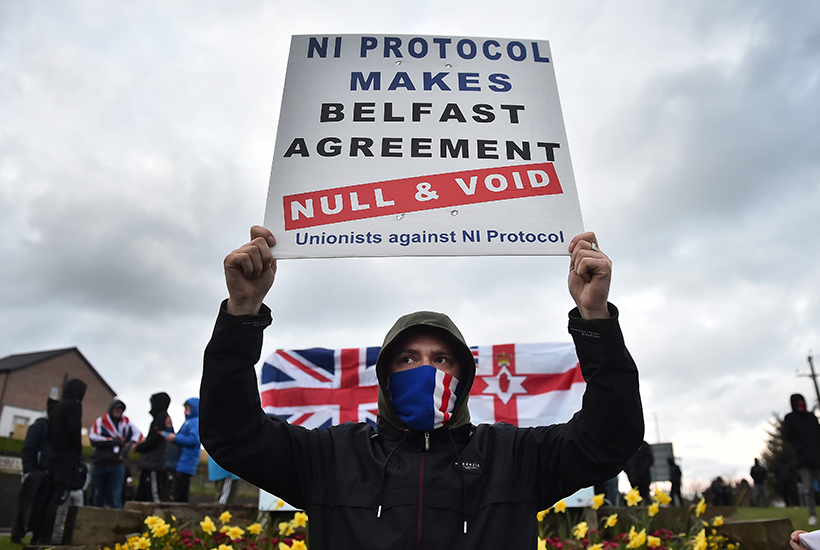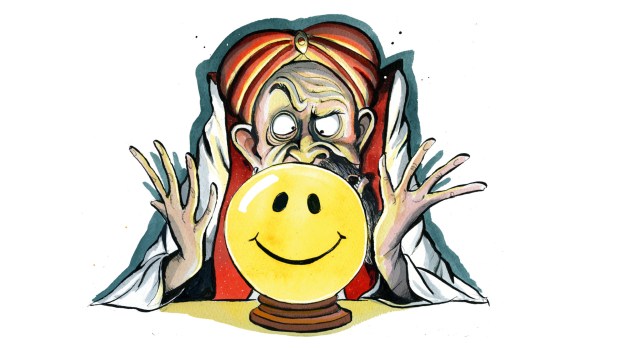Britain has already seen two ‘Brexit days’ — when it formally left the EU on 31 January 2020 and the end of the transition period 11 months later. But given that it has taken less than six months for the Northern Ireland protocol to unravel, it’s horribly clear that our future relationship with the EU is anything but settled.
The transport of sausages and other chilled meats from Britain to Northern Irish supermarkets may seem a trivial matter. But the attempt by the EU to enforce a ban on this trade demonstrates what so many people found problematic about the idea of an internal UK border down the Irish Sea. And it is surely a harbinger of battles to come.
The protocol was supposed to be a tool which would do away with the need for a hard border between Northern Ireland and the Republic. Instead, it threatens simply to shift the hard border to between Belfast and Stranraer — stirring community tensions in the process, and defying the principles of the Good Friday Agreement.
Already the protocol is bitterly resented: polls show almost half of those in Northern Ireland want it scrapped, a figure that will rise if the EU intends to maximise the disruption it causes. That hasn’t stopped Joe Biden appearing to take the side of the EU in the dispute.
But what did the UK government expect when it signed up to the protocol, which instigated customs checks on goods transported between Britain and Northern Ireland? The perils of such arrangements were there for all to see — which is why Theresa May, who relied on DUP votes following her 2017 election debacle, dismissed the idea from the start. Boris Johnson resigned as foreign secretary in protest at May’s support for the EU’s proposed alternative: a ‘backstop’ which would have allowed the EU to continue to lay down regulation in the UK. Yet he signed up for an arrangement which came with its own serious problems.
Read the protocol and you can see what the government means when it argues that the agreement was never intended to be the last word on post-Brexit arrangements. The text mentions nothing about sausages, but it does speak of setting up a working party to establish the finer details of its implementation. Moreover, Article 16 states that if the protocol leads to ‘serious economic, societal or environmental difficulties’ then the UK would have the power to take its own ‘safeguarding measures’.
The government has already attempted to use this provision once, even before the protocol came into effect — under the Internal Market Bill, which would have allowed the government to override aspects of the protocol. The offending provisions, however, were removed in December to allow negotiations for a trade deal to be completed.
Nevertheless, why did the Prime Minister not anticipate that the EU would attempt to use the protocol to add friction to life after Brexit? Right from the beginning of the negotiations, the bloc’s negotiators used every trick at their disposal to try to make sure that Britain was seen to get a bad deal, or ‘punishment beatings’ as Johnson put it. It should have been obvious that the Northern Ireland protocol, too, would be used to try to make life awkward for the UK — under the auspices of preserving the integrity of the single market.
Either the Prime Minister and his negotiators could not see that in 2019, or they simply ignored it because of the political imperative of getting a deal. But the situation must now be put right. It is simply unworkable to have the EU able to block the transport of certain goods from Britain to Northern Ireland when it is clear that those goods are going to remain in Northern Ireland and are, therefore, no threat to the single market.
Sooner rather than later the protocol is going to have to be revisited. There are two ways to do this. One is in a spirit of mutual cooperation and respect which remembers that the protocol was about trying to come up with a solution that respected both the Good Friday Agreement and the single market. The other is with aggressive language and warnings of tariffs.
Much as the EU might like to threaten a trade war over the issue, it does not wield nearly as much power as it wants to. As many warned throughout the Brexit process, thanks to the trade gap between the UK and the EU, EU exporters have even more to lose from the interruption of trade than UK exporters do. While we are not in normal economic times, the early indications do not suggest that the EU’s gameplaying has succeeded in punishing UK exporters without damaging its own exporters — quite the contrary, in fact. HMRC’s trade figures for March show that UK exports to the EU were up 14 per cent on those of March last year, while UK imports from the EU were down 4 per cent. UK exports to the rest of the world surged by 30 per cent over the same period, showing what opportunities are on offer as we take control of our own trade policy.
The protocol was supposed to protect both the Good Friday Agreement and the integrity of the single market. This need for balance must be respected and pragmatic solutions — such as a trusted trader scheme for food, which removes the need for checks on goods from registered firms — found.
Got something to add? Join the discussion and comment below.
Get 10 issues for just $10
Subscribe to The Spectator Australia today for the next 10 magazine issues, plus full online access, for just $10.
You might disagree with half of it, but you’ll enjoy reading all of it. Try your first month for free, then just $2 a week for the remainder of your first year.














Comments
Don't miss out
Join the conversation with other Spectator Australia readers. Subscribe to leave a comment.
SUBSCRIBEAlready a subscriber? Log in